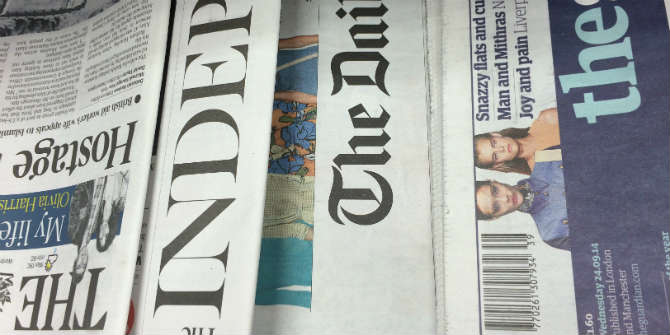 Steven Barnett, Professor of Communications at University of Westminster, analyses UK prime minister Theresa May’s decision to effectively dismiss Rona Fairhead as BBC chair, and the implications for future BBC governance.
Steven Barnett, Professor of Communications at University of Westminster, analyses UK prime minister Theresa May’s decision to effectively dismiss Rona Fairhead as BBC chair, and the implications for future BBC governance.
There are two ways of looking at Theresa May’s decision to reverse Rona Fairhead’s appointment as BBC chair, thereby effectively dismissing her. The first is benign, reflecting a genuine impatience with David Cameron’s decision to allow Fairhead to move across from the BBC Trust to the new Unitary Board, which will come into effect early next year. But there is another interpretation with worrying implications for the BBC’s global reputation for independence from state control.
The more charitable argument goes like this: Fairhead’s appointment was a unilateral decision by May’s predecessor, which went through no formal consultative process and allowed no other suitable candidates to be considered. It lacked any transparency or accountability and was condemned by the cross-party Culture select committee.
May was therefore marking her new style with a commitment to transparency and due process, starting with one of the most important and high-profile public sector jobs in the country.
Taking charge of Auntie
An altogether more worrying interpretation is that Fairhead was unceremoniously sacked because she had not been personally approved by the new prime minister. She was perceived as part of the ancien régime which May had swept aside on her arrival in Downing Street and – even worse – was supposedly a close ally of George Osborne.
At the Home Office, May was regarded as something of a control freak. Fairhead’s treatment – described as “brutal” by former BBC vice-chair Diane Coyle – was, according to this less charitable argument, the hallmark of a new prime minister intent on imposing her preferred candidate on the most influential media institution in the country.

To be clear, we don’t know which is the accurate interpretation. But this issue is a matter of fundamental importance for both the BBC and the UK for two reasons. First, under the government’s new Charter proposals foreshadowed last year in the government’s White Paper, the unitary board will be the sovereign body of the BBC, making vital strategic decisions about investment, strategy, allocation of funds across services, recruitment to senior positions and sometimes controversial editorial issues.
The new chairman will be the most powerful in BBC history, with the potential for making life very difficult indeed for any director-general with whom he or she takes issue. Moreover, it appears that the new Charter allows for the government-appointed chairman to be involved in appointing the rest of the BBC board. There is therefore the potential for a government hand firmly on the BBC tiller.
Question of trust
That raises the second crucial issue, which will reverberate well beyond the UK’s borders: BBC independence. In Britain, the BBC is one of the most trusted institutions in an increasingly sceptical world where neither print nor online journalism, nor social media such as Facebook or Google, are seen as reliable sources of information.
In the rest of the world, the BBC is universally admired as a model of how to run a publicly funded institution in the public interest while remaining wholly separate from the state. Any suggestion that a 90-year history of freedom from state intervention might be compromised by a government determined to impose its preferred candidate will be seized upon by less democratic regimes as justification for their own political power grabs.

So how will we know whether May is acting as a guardian of the public interest or an interfering political opportunist? The answer will lie in the mechanism for appointment of both the new chairman and the four other government appointments – national directors for England, Wales, Scotland and Northern Ireland – of the 14-strong board.
Who will whittle down candidates to a shortlist? How will the selection panel be determined and how independent will it genuinely be? Will candidates be asked to appear in front of an open session of the Culture select committee? Will the selection panel be informed of the secretary of state’s preferred candidates, as former culture secretary John Whittingdale insisted was his right during the public appointments process for a new trustee of the National Portrait Gallery? And, of course, who will make the final decision?
At arms’ length
If the new prime minister wants to reassure her critics, the BBC, and the rest of the world, she has a very simple option: remove the new chairman’s appointment entirely from the political decision-making system. There are precedents for establishing independent appointments bodies guaranteed to be free from any political contamination. We have a Judicial Appointments Commission which appoints senior judges, and there is no suggestion that Britain operates a state-sponsored judiciary. We have the new Press Recognition Panel, established as part of the post-Leveson framework on press self-regulation, which is equally untainted.
So Theresa May has it in her power to send a strong message that her government understands the difference between a public broadcaster protected from political interference and a state broadcaster subject to the whim of political leaders. It would be reassuring to know that the BBC really is safe in her hands – and that the dismissal of Rona Fairhead was principled rather than prejudiced.
![]() This article was originally published on The Conversation. Read the original article. This post gives the views of the author and does not represent the position of the LSE Media Policy Project blog, nor of the London School of Economics and Political Science.
This article was originally published on The Conversation. Read the original article. This post gives the views of the author and does not represent the position of the LSE Media Policy Project blog, nor of the London School of Economics and Political Science.





